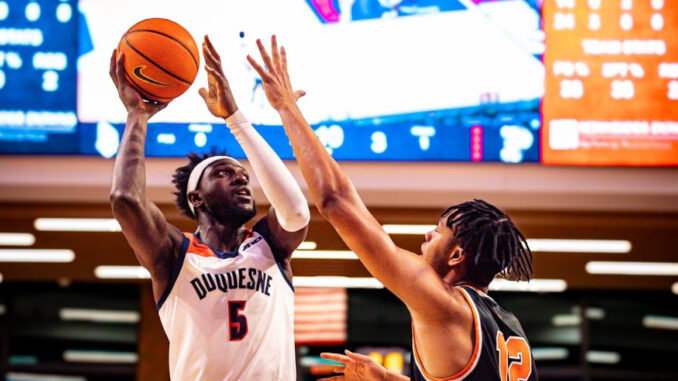
Mary Genrich | Staff Writer
Halil “Chabi” Barre showed up for practice 30 minutes early on Jan. 30, 2023, just like he always had. He planned his normal pre-practice workout.
“The last thing that I remember was going for a dunk,” Barre said. “The next thing I remember is waking up in the hospital.”
Barre had collapsed.
“It was just another day,” Duquesne men’s basketball manager Conlan O’Donoghue said, before he turned around and saw Barre’s 6’9-inch frame lying motionless on the ground.
O’Donoghue remembers seeing Head Coach Keith Dambrot and former graduate assistant Tim Baker sprinting out of the gym to get help.
“I don’t think my mind comprehended what was actually happening,” O’Donoghue said. “When I saw the trainers Hendo and Yuta come rushing in, I knew something was wrong.”
“It was a scary scene, they were doing CPR basically trying to resuscitate him,” O’Donoghue said.
Barre returned to the court for this season’s opener against Cleveland State, and has started 12 of 14 games this season, averaging 2.9 rebounds per game.
“The first week was very emotional for me.” Barre said. “At one point I didn’t know if I was going to ever play basketball again.”
Barre spent nine days in the hospital undergoing several tests to figure out what happened. He also saw a doctor from the NBA in the hope of finding answers.
“They still couldn’t find anything and I didn’t know if they were going to let me play basketball again because nobody wanted to take the risk,” Barre said.
Before the collapse, Barre had missed 17 games due to an MCL tear. O’Donoghue recalls how Barre began to show signs of his true potential when he came back from his knee injury.
“It broke us to see him go down and be out for the rest of the season because we know how much hard work and dedication he put into it,” O’Donoghue said.
After months of tenuous rehab for his knee, Barre finally got cleared and was able to play in 12 games before the medical emergency ended his 2022-23 campaign.
Stuck on the sidelines, Barre decided he did not care if he needed another surgery.
“I just wanted to go back and play basketball,” Barre said.
For the next few months he underwent more tests, cardiac rehab and two surgeries. The first one tested his heart for arrhythmia. The test entered his heart through his right leg and came back negative. In the second surgery doctors placed a heart monitor into his chest next to his heart.
“It can basically track my heart rate every second and that will stay there forever,” Barre said. “And now all the doctors [and] the trainers can track my heart rate through their phone.”
When Barre first came back after his health complications, everyone was nervous.
“The rules were that I have to be honest with the trainers about if I am not feeling good even if it’s a little bit, I got to tell them so they can take me out.”
He is still getting used to the movement he feels from the heart monitor in his chest.
“For the first two months, every time I worked out, I could feel something moving right next to my heart,” Barre said.
Throughout his hospital stay, Barre received many visitors and support from coaches and teammates. Midway through last season, Barre’s teammates added a blue heart patch to their uniforms in honor of him.
Barre looks back on his freshman year as a really difficult time in his life. He said he would not wish it on his worst enemy.
“I cried a lot of times. I was so depressed,” Barre said. “I was on the bench seeing my team losing. It really hurts me knowing I could be on the court helping my team to win this game.”
Barre used other people who had the same thing happened to them as to motivate himself. He is one of several athletes, such as Damar Hamlin and Bronny James, that have suffered cardiac-related incidents.
“I just had to be patient, trust God, keep working to do what I can control,” Barre said. “It was very hard sometimes.”
Despite still not having an official diagnosis, Barre is happy to be back playing basketball again.
“I was sitting there crying. I was talking to mysel,” Barre said. “This game could have been taken away from me, and now, I just don’t take anything for granted anymore.”
